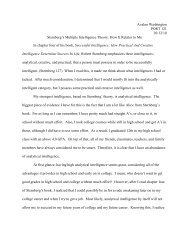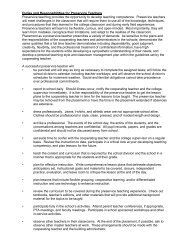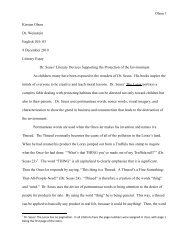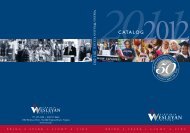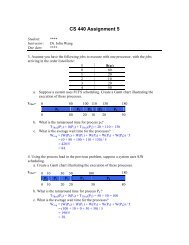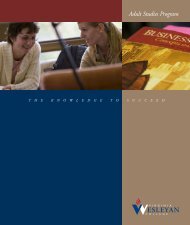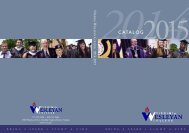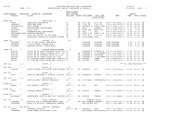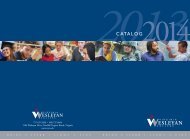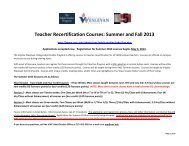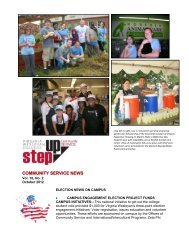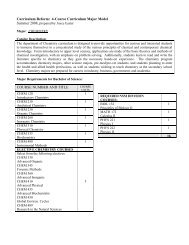2008-2009 Catalog - Virginia Wesleyan College
2008-2009 Catalog - Virginia Wesleyan College
2008-2009 Catalog - Virginia Wesleyan College
- No tags were found...
Create successful ePaper yourself
Turn your PDF publications into a flip-book with our unique Google optimized e-Paper software.
CENTER FOR THE STUDY OF RELIGIOUS FREEDOM61410 Evolution (3)A study of the theories of evolution and theirproponents in both vegetable and animal kingdoms.Prerequisite: junior/senior status. Offered each fall.420 Cell and Molecular Biology (4)A study of the structure and function of prokaryotes andeukaryotes at the cellular and molecular level. Emphasis isplaced on the molecular nature of cellular structure,metabolism and physiology. Prerequisite: a grade of C orbetter in CHEM 311, 312, 321 and 322. Offered spring ofeven-numbered years.445 Limnology (3) WIntroduces the study of fresh waters, including lake,pond, river, and stream ecosystems. Emphasis is placedon physical processes, primary and secondaryproductivity, biogeochemical cycling, and food webinteractions across all trophic levels. Prerequisite: BIO131 and 132 or equivalent or BIO 207, with a grade of Cor better. Offered spring of even-numbered years.460 Zymurgy: the Science of Fermentation (3) (I)(Winter Session)Introduces the science and art of fermentation and aconsideration of the use of alcohol by human societies.Prerequisite: senior status or consent. Offered in selectedWinter Sessions and spring semester.470 Internship in the Natural Sciences (3)An intensive study of a particular field of sciencethrough on-site field experience. Internships involve handsonopportunities in the sciences that are relevant to thatparticular site. Students are expected to devote a minimumof at least 120 hours for three semester hours, but someplacements may require more time. Students mustcoordinate their internship placement with the supervisingfaculty member at least two months prior to placement.Pass/fail grading. Prerequisites: junior/senior status andconsent. Offered each semester.475 Natural & Social Historyof the Chesapeake Bay (3)(I)Gives students a comprehensive view of one of thelargest and most diverse estuaries in the world, theChesapeake Bay. Students examine the relationships amongthe natural history (flora and fauna), human history,including social and political aspects, use of the bay bydifferent societies, their impact on and preservation of thebay. Saturday field trips required. Prerequisite: junior/seniorstatus. Offered on demand.480 Readings in Biology (1)An advanced seminar that discusses readings from theprimary literature on various announced topics in biology.May be repeated for credit as topics change. Prerequisite:senior/junior status and consent. Offered on demand.482 Microbiology (3)Teaches basic microbiological concepts and the role ofmicroorganisms in various applied areas. Topics include:microbial physiology, cell structure, microbial genetics,pathogenic microorganisms and human diseases, andenvironmental and applied microbiology. Corequisite: BIO484. Prerequisites: BIO 311. Offered spring of oddnumberedyears.484 Microbiology Laboratory (1)Techniques of culturing and identifying microorganismsare taught. Procedures include: culturing,staining, determination of microbial numbers, effect ofenvironmental influences, identification of enzymaticreaction, and isolation and identification of bacterialcultures. Corequisite: BIO 482. Prerequisites: BIO 311.Offered spring of odd-numbered years.485 Seminar in Biology (1)An advanced seminar on various topics in biology. Eachstudent will conduct in-depth library research on a topicof interest and present a seminar to the department.Prerequisite: senior/junior status and a major or minor inthe natural sciences. Offered each spring.489 Research in the Natural Sciences (3)Provides students with the opportunity to conductoriginal scientific research in an area of interest. Studentswork closely with one or more members of the naturalscience faculty to develop and conduct a research project.Students present their findings orally during the semester’sundergraduate research symposium and as a formal researchpaper. Students are encouraged to present their findings ata conference. Prerequisite: junior/senior status and a majorin the natural sciences, prior approval by the projectadviser, and consent of the instructor. May be repeated oncefor a total of 6 semester hours. Identical to CHEM 489 andEES 489. Offered each semester.BUSINESS(See Management, Business and Economics)CENTER FOR THE STUDYOF RELIGIOUS FREEDOM(Also see page 45)DR. PAUL B. RASOR, DirectorThe study of religious freedom is inherentlyinterdisciplinary. It is concerned with the critical FirstAmendment issues of free exercise of religion and churchstateseparation, as well as the larger political, social andreligious contexts within which these issues arise. Thismeans that it draws on a wide range of disciplines,including history, law, philosophy, political science,



